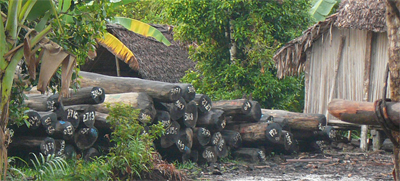Despite government assurances that it would crack down on the rosewood trade, illegal logging continues in Madagascar’s rainforest parks, according to new information provided by sources on the ground.
The sources report logging in three parks: Mananara, Makira, and Masoala. All three are known for their high levels of biodiversity, including endangered lemurs.
Rosewood logs are being transported to Tamatave (Toamasina), Madagascar’s main port, despite a national moratorium on logging and export of precious hardwoods. Most rosewood ends up going to China, where it is in high demand for furniture.
 Rosewood logs said to have been cut in Makira Natural Park, one of Madagascar’s largest protected areas. |
The Malagasy sources report that local law enforcement—the new Brigade Mixte Forestière established to reduce logging—is impeded the Forest Ministry (Ministère de l’Environnement et des Forêts – MEF), which has failed to grant them the right to use search warrants on private property.
The sources also claim that rosewood confiscated by authorities is being stolen from official stockpiles.
Illegal logging exploded last year in the aftermath of a military coup that displaced the democratically-elected, but increasingly autocratic president, Marc Ravalomanana. National parks, especially in the Northeast of the country, were ransacked by loggers employed by timber barons who traditionally capitalize on political instability or natural disasters to replenish timber stocks and traffic ill-gotten wood.
Madagascar is now ruled by a “transition authority” that has so far shown little inclination to hold free and fair elections and has been be slow to address the logging crisis despite pressure from the international community.
Related articles
If Madagascar’s biodiversity is to be saved, international community must step up

(07/27/2010) The international community’s boycott of environmental aid to Madagascar is imperiling the island’s unique and endangered wildlife, according to a new report commissioned by the US Agency for International Development’s (USAID) Bureau of Africa. International aid to the desperately poor nation slowed to a trickle after a government coup last year, including a halt on environmental funding from the US government. Since then the island has experienced an environmental crisis: illegal loggers and traders began decimating protected areas, and the wildlife trade, including hunting endangered lemurs for bushmeat, took off.
The illegal logging cycle in Madagascar
(06/23/2010) The latest issue of the journal Madagascar Conservation & Development provides a comprehensive look into Madagascar’s illegal logging trade, which has generated more than $200 million for a small group of individuals over the past year. The trade, which spikes just prior to national elections and may be a source of funds for ruling politicians, has taken a heavy toll on the lowland rainforests of Madagascar, with targeted species now at risk of extinction.
Rainforest slaughter continues in Madagascar despite “ban” on timber exports

(06/21/2010) New eyewitness reports indicate continued logging of Madagascar’s Masoala National Park for rosewood despite a government “moratorium” on logging and timber exports. A source near Marofinaritra, a town between Masoala and Antalaha, reports heavy night-time movement of trucks carrying illegally logged timber from the park. The wood is believed to be destined for Antalaha, a regional hub for the rosewood trade.
Madagascar passes decree banning rainforest timber trade
(04/27/2010) Madagascar’s transitional government has finally signed a decree banning the logging and trade of precious hardwoods, a month after announcing the moratorium.
How to end Madagascar’s logging crisis

(02/10/2010) In the aftermath of a military coup last March, Madagascar’s rainforests have been pillaged for precious hardwoods, including rosewood and ebonies. Tens of thousands of hectares have been affected, including some of the island’s most biologically-diverse national parks: Marojejy, Masoala, and Makira. Illegal logging has also spurred the rise of a commercial bushmeat trade. Hunters are now slaughtering rare and gentle lemurs for restaurants.
Satellites being used to track illegal logging, rosewood trafficking in Madagascar

(01/28/2010) Analysts in Europe and the United States are using high resolution satellite imagery to identify and track shipments of timber illegally logged from rainforest parks in Madagascar. The images could be used to help prosecute traders involved in trafficking and put pressure on companies using rosewood from Madagascar.
Coup leaders sell out Madagascar’s forests, people

(01/27/2010) Madagascar is renowned for its biological richness. Located off the eastern coast of southern Africa and slightly larger than California, the island has an eclectic collection of plants and animals, more than 80 percent of which are found nowhere else in the world. But Madagascar’s biological bounty has been under siege for nearly a year in the aftermath of a political crisis which saw its president chased into exile at gunpoint; a collapse in its civil service, including its park management system; and evaporation of donor funds which provide half the government’s annual budget. In the absence of governance, organized gangs ransacked the island’s biological treasures, including precious hardwoods and endangered lemurs from protected rainforests, and frightened away tourists, who provide a critical economic incentive for conservation. Now, as the coup leaders take an increasingly active role in the plunder as a means to finance an upcoming election they hope will legitimize their power grab, the question becomes whether Madagascar’s once highly regarded conservation system can be restored and maintained.